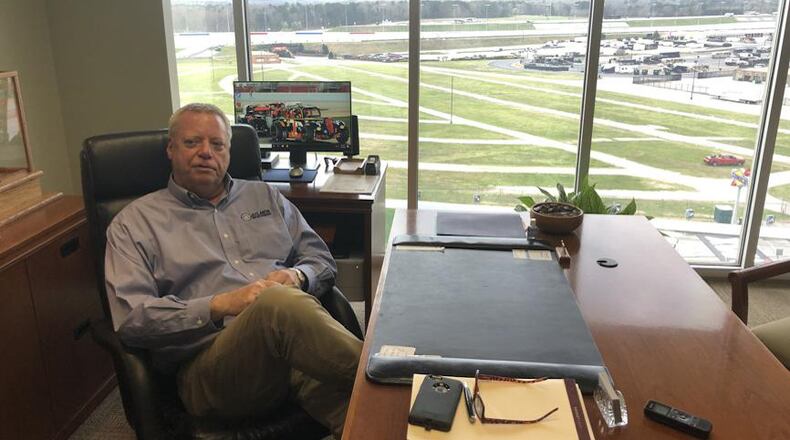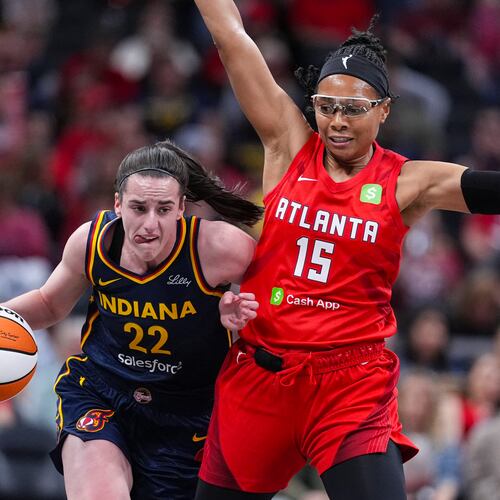In his more than 27 years running the shrine to internal combustion and eternal optimism called Atlanta Motor Speedway, Ed Clark has – not single-handedly, mind you – beaten back all manner of plagues.
Stuff powerful enough to bring the 800-horsepower rolling billboards of his sport to a screeching halt.
When a storm of a century struck in March 1993, dropping the scheduled race week into the deep freeze, AMS was up and racing a week later.
When a tornado tore up a little bit of everything except the asphalt in July 2005, they cleaned up the track and got it presentable for the October race, back when there was an October race.
And when in 2011 the track lost one of its two annual dates during a big NASCAR schedule shuffle, effectively cutting its revenue stream in half, management didn’t throw up its hands and surrender to the cruel realities of a sport seeking a new identity in new places. It adapted. It improvised. It added a state fair, a music festival, foot races, RV shows, et cetera, et cetera.
“Over the last six to eight years, we’ve gone from strictly a racetrack to an entertainment facility,” Clark said. “Last year we had 356 days of track usage.”
They kept on racing, too, once a year, early in NASCAR’s almost endless season.
But maybe not this year. Along came a microbial virus, an invisible menace that had the whole world in a toilet-paper-hoarding frenzy. This challenge, no amount of determination or imagination could overcome. There was no outracing or outmaneuvering the coronavirus. On the weekend that was to be the last for Clark as the speedway’s president – this weekend – the 1.54-mile track fell as silent as a country lane. Clark would go out on a sigh rather than one last roar.
“I told (AMS General Manager Brandon Hutchison) right after the race last year, next year is going to be my last, and I want it to be memorable,” Clark said Friday. “Maybe I wasn’t specific enough on what memorable should be.”
To the end, Clark was the consummate promoter, putting lipstick on the situation and looking at it in the most flattering kind of light.
“This too shall pass,” he said.
“We’ve been through a lot of things, and there are a lot bigger issues than our race weekend. We worked hard, we had a lot of momentum, ticket sales were great, the sport has good momentum. TV ratings are up, attendance is up at most all the tracks and the racing has been the best it’s been in a while. I just hope this doesn’t interfere with that.”
After a long week of evolving options, this weekend’s Folds of Honor QuikTrip 500 was, like every other public gathering, postponed. Clark said that was done with the intention of running the race later this year – there are two mid-summer open dates in the NASCAR schedule. But if the race postponements go beyond a couple of weeks, a distinct possibility, it becomes more likely that the postponement becomes a cancellation.
That will be someone else’s problem. Clark, 65, still will be involved with the speedway’s push to build a neighboring casino/resort complex, but he has left behind the on-track part of his life.
It has been years, too, since he raced himself, lastly in the tiny Legend cars. He does not intend to take that up again in his spare time. “People are trying to get me to come back, but my back is so bad I don’t know if I could get out of the car,” Clark said.
He does not move on without a fond glance backward. More than a businessman, Clark came to his job from a fan’s place. Growing up in rural Virginia, he began keeping scrapbooks of newspaper clippings and signed drivers’ cards when he was 8.
“I would write letters to drivers and ask for autographed pictures, get their hero cards. I would ride my bicycle to the mailbox and wait for the mailman to come, and if I got an autographed card from Ned Jarrett or Fred Lorenzen, it was like the biggest thing in the world. To be that kid who got to do what I did for a living, I have to pinch myself,” he said.
That same kid grew up to know the late, great Dale Earnhardt (nine times a winner in Atlanta) long before he was canonized. He even spent a few days in Earnhardt’s home after moving to Charlotte for a job. He has been around long enough to count two generations of Elliotts – Bill and Chase – as friends and dependable allies of their home-state track. Between his connections and his affection for the sport, Clark was and still is the most powerful, convincing and sincere voice for racing in Atlanta.
The opposing bookends of his long career couldn’t be more of a contrast. At one extreme is this deflating weekend of lost racing. But at the beginning was a race that may have been richer in story lines than any other.
Clark arrived at AMS in July 1992, four months in advance of the season-ending race there that year. “The second day on the job we sold the last reserved seat,” he remembered. “And I was all excited about that. I called up Bruton (track owner Bruton Smith) and said, hey, I got some great news, we sold the last reserved seat today. His only response was, ‘What took you so long?’”
For that race was Richard Petty’s last ride. As it turned out, it also was Jeff Gordon’s debut (he made it halfway before crashing). Bill Elliott won the race. Alan Kulwicki won a hotly contested series championship. There were more angles to that day at the track than in any geometry text.
As Clark ticks off other memorable Atlanta races, he stops at the very next one in early ’93, the snowed-out one. Of those run on schedule, he’ll mention Kevin Harvick in 2001 getting a first win in Earnhardt’s car after the legend’s death in Daytona and the charismatic Carl Edwards announcing himself with wins on Saturday and Sunday of the March race in 2005.
Notably, Clark’s time at AMS has spanned boom times and recession in his sport. He has been witness to, and a part of, racing’s wild extremes.
What he sees going forward is no less hopeful than you’d expect of a lifelong race promoter. While the sport has been in a period of decline, losing fans and sponsorship money, Clark seems to be bullish on the future.
“No question, NASCAR fell off in a lot of areas,” he said. “This is probably what you’d expect me to say, but I 100 percent believe the management we have now at NASCAR is the strongest group we’ve had down there probably ever. The competition, the passes on the track, the passes for the lead are higher than we’ve had in years. TV ratings are going back up – not in dramatic numbers, but they’re up. New money is coming into the sport.
“Are we where we want to be? No. But I think we have realistic expectations, and we’re meeting that.”
This while awaiting the next galvanizing personality capable of breaking through in a sport that is so often helmeted and faceless.
“Everybody is looking for that Tiger Woods in every sport,” he said. “One comes along only once in a while. I think Chase Elliott could be that guy for us, but you got to win, and you’ve got to win some championships.
“We’ve been accused of having a lot of vanilla drivers – everybody likes them, all the sponsor lines (they recite). We need guys in black hats and guys in white hats and new guys coming along and knocking them both off. That’s a healthy sport. We’re pretty well-positioned. But we don’t have that Tiger Woods, that Dale Earnhardt, that Richard Petty right now.”
Rather than taking in a last race as track president Sunday, Clark said he may go fishing. Or lounge around the house. He’ll think of something. He always does.
Sure, he would have preferred to go out on all the clamor and color of a race day, one ending in a bumping, banging, last-lap duel to the finish. But he even found something apt about this sad coronavirus Sunday without competition.
“You hope for that (going out on a high note),” he said. “You have to adapt. In a way, it’s been kind of appropriate because my whole career here at Atlanta Motor Speedway has been one of something happening and then reacting to it.”
About the Author
Keep Reading
The Latest
Featured




